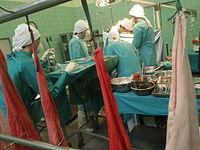
Photo from wikipedia
De novo malignancies constitute an emerging cause of morbidity after solid organ transplant (SOT), significantly affecting the long-term survival of transplant recipients. Pharmacologic immunosuppression may functionally impair the immunosurveillance in… Click to show full abstract
De novo malignancies constitute an emerging cause of morbidity after solid organ transplant (SOT), significantly affecting the long-term survival of transplant recipients. Pharmacologic immunosuppression may functionally impair the immunosurveillance in these patients, thereby increasing the risk of cancer development. Nevertheless, the multiplicity and heterogeneity of the immune effects induced by immunosuppressive drugs limit the current possibilities to reliably predict the risk of de novo malignancy in SOT patients. Therefore, there is the pressing need to better characterize the immune dysfunctions induced by the different immunosuppressive regimens administered to prevent allograft rejection to tailor more precisely the therapeutic schedule and decrease the risk of de novo malignancies. We herein highlight the impact exerted by different classes of immunosuppressants on the most relevant immune cells, with a particular focus on the effects on dendritic cells (DCs), the main regulators of the balance between immunosurveillance and tolerance.
Journal Title: Frontiers in Oncology
Year Published: 2019
Link to full text (if available)
Share on Social Media: Sign Up to like & get
recommendations!